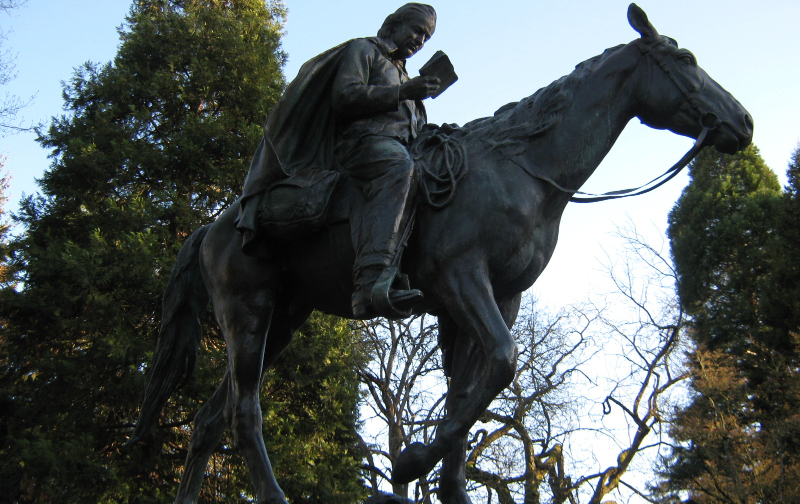
When at Union Seminary in New York City we lived near Grant’s Tomb in Riverside Park. The old joke was about the tourist who asked, “Who’s buried in Grant’s tomb?” Such monuments and statues have a way of becoming invisible. Mute icons crowned with pigeons. No longer.
Suddenly, we’re looking at those neglected figures. We’re talking about who they are and why they are there. We’re asking, should they be there?
Last weekend we were driving through the Columbia River Gorge. Along the highway are frequent historical signs depicting Lewis and Clark. They had come down the Columbia when it was a much wilder river, on the final stretch of their journey of exploration across the continent. At crucial junctures along the way their expedition had been bailed out by Indians, the Nez Perce in particular, who were more than generous to Clark and Lewis and their woebegone comrades after their winter passage through the Bitter Root Mountains of present day, Idaho.
As we drove, I wondered, will those signs depicting Lewis and Clark be coming down? Should they be coming down? Should other signs and memorials go up?
We’ve celebrated the stories of Lewis and Clark and of the pioneers of the Oregon Trail, but there’s another story. The story of those, like the Nez Perce and Umatilla, who were already there and of the evils that befell them as European Americans, who had been starved and brutalized in Europe, crowded west.
On the grounds of the Oregon State Capitol in Salem, there is a statue of man who is distant relation of mine, Robert Booth. My middle name is Booth, from my mother’s side of the family. Robert Booth was the first Methodist Circuit Rider in the Oregon Territory, sometime in the 1840s. So far as I know, Robert Booth is my only ancestor who was a clergy person. Until me. He stands there, east of the capitol, on horseback, an open Bible in one hand, reins in the other.
Should the statue of Robert Booth come down? An argument can certainly be made that he was part of the colonial incursion, and as such the genocide against Indians. I don’t know the answers to these questions.
That the statues of Confederate soldiers and generals, especially those erected during the Jim Crow era, should come down seems an easier case to make. But of course, they aren’t my relatives.
But beyond that?
My thought is, I really wish we knew our history as Americans way better. And that we knew that history in its complexity, the good, the bad and the ugly. Not just the triumphalist versions, where all the white men are strong, the women good looking and the children above average. But not a Jacobin revisionism where all the white men are evil, etc. that cancels all that someone doesn’t like in the name of a new higher consciousness.
I worry that the statues become political footballs and the cause celebre of the moment when what we really need is to make up for the years when we have been indifferent to our nation’s history. Moving the statues around may be a sort of deck chairs on the Titanic exercise if we don’t do a deeper dive into the complex history of this nation. On the other hand, the statues could be an entry point.
But the statues are the tip of that iceberg. The debate over them is a debate over our national story. I get it. It’s important. But I worry that we mistake the fight over statues for a deeper, more conflicted and complicated, understanding of all that we are. It should be good moment — even a great moment — for teaching U.S. history in the high schools and colleges. Alas, STEM (science, technology, engineering and math) have become the new orthodoxy. If education doesn’t lead to a job, why bother? History, along with the other liberal arts, have seemed unimportant, irrelevant, not job-ready.
Maybe not?
In wanting our history to be cleaner and less ambiguous, either as a triumphalist narrative or a revisionist, anti-colonial one, it is really ourselves that we want to make less complex, less conflicted, more perfect. But our ancestors weren’t, and neither are we.

I say let Robert Booth ride on. It’s troubling, when we start attempting to deny history, where to stop. Mississippi can change its flag, but not its past. We can try to ban books, but somehow the ideas survive. Should we change the name of the Columbia River? Woody Guthrie’s heirs would go on singing about it anyway. King County was able to lose Rufus and gain Martin only because it could be done without spending very much taxpayer’s money. On this one, I’m sticking with Jesus (John 8:7). The one about He without sin casting the first stone.
As Groucho Marx knew, the correct answer to who is buried in Grant’s Tomb is no one. Grant and his wife are encased in sarcophogi above ground. But Groucho always gave every
contestant a consolation prize. Nobody ever lost, because it was a trick question. Groucho was right about another thing as well: “There is no Sanity Clause.”
Rev. Robert Booth was my Great Great Great Grandfather, just let him be. It’s Oregon’s history. Even if the statue came down, the history doesn’t change.